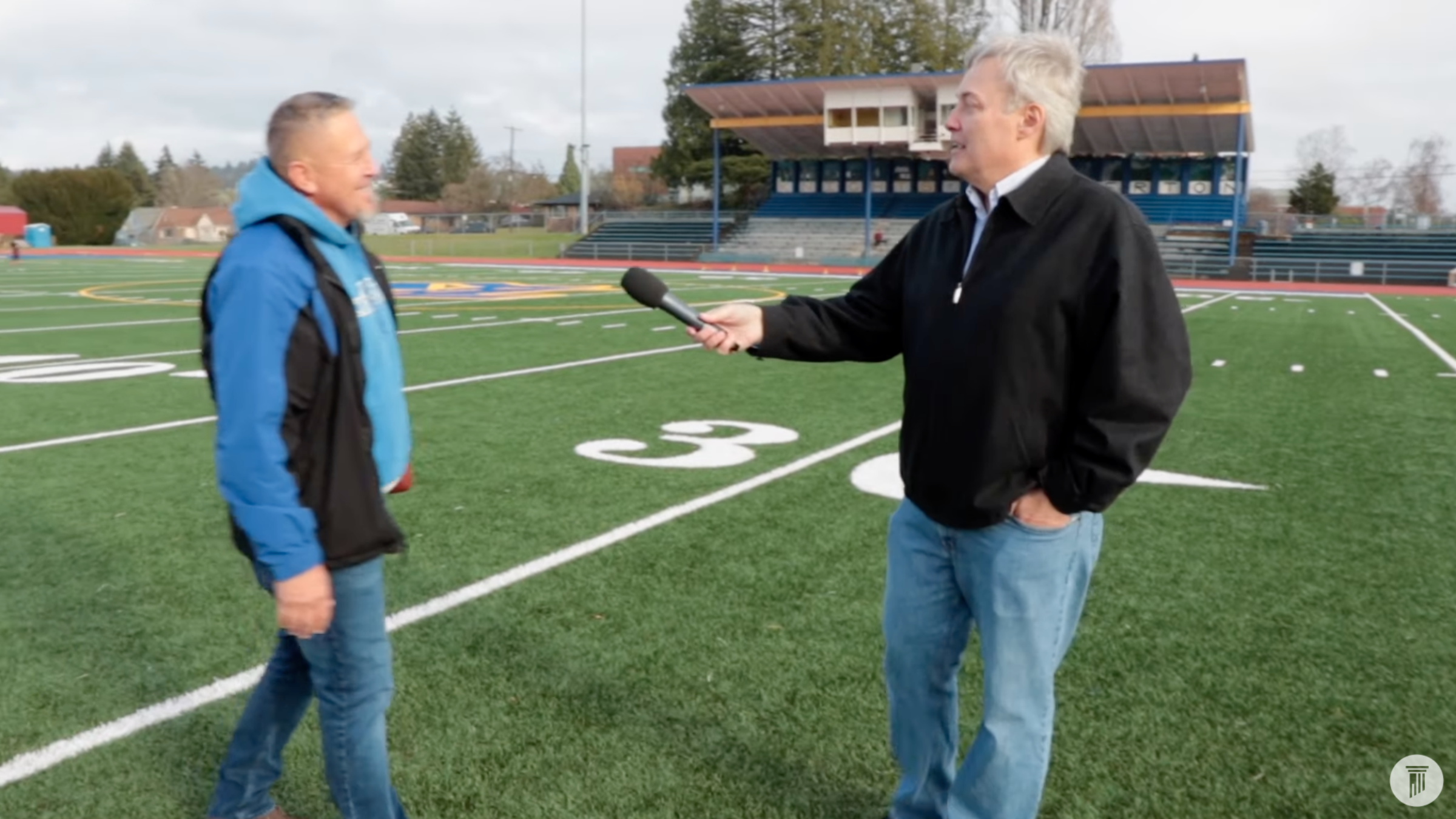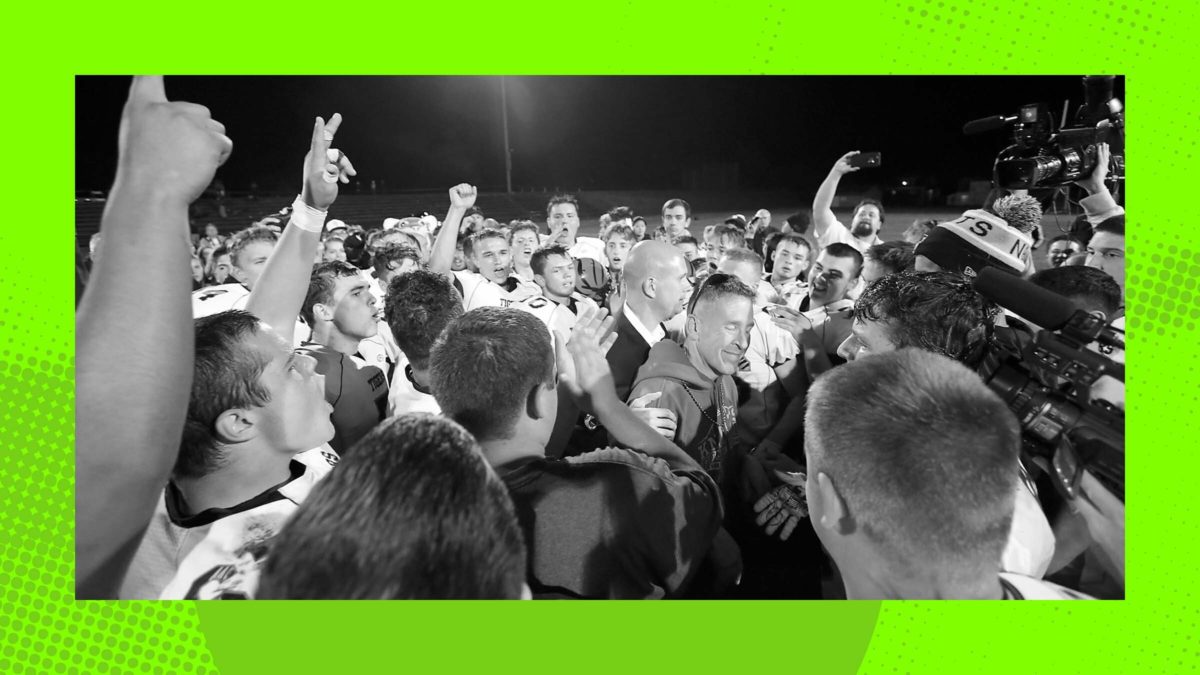In this COVID-19 age when millions of Americans are switching careers, Joseph Kennedy is a poster child for career reboots. At one time, he was an obscure assistant high school football coach. Now, he is the high-profile face of a lavishly-funded campaign to ramp up the presence of Christian prayer in schools across the country.
Last month, the Supreme Court agreed to hear Kennedy’s challenge to his school’s decision to sideline him because he would not stop praying with his students. His case, Kennedy v. Bremerton School District, provides the Court’s far-right majority with their latest opportunity to whittle away at the First Amendment.
Kennedy can come off as a small-town football coach, if one with a “Support Coach Joe Kennedy” Facebook page and a slick “On to Victory!” web page detailing every twist and turn of his lawsuit. But it makes more sense to think of him as a human battering ram, whom rich, powerful, and shadowy interests want to use to knock yet another brick out of the wall between church and state.
As of 2015, Kennedy was a coach for the junior varsity football team at Bremerton High School in Bremerton, Washington, a military town located an hour-long ferry ride west of Seattle. He regularly delivered prayers on the 50-yard line at the end of games, and sometimes invited coaches from opposing teams to participate. The school district’s brief opposing certiorari contains photographs of Kennedy surrounded by students kneeling reverentially, and notes video footage showing Kennedy ending his prayers with an “amen.”
In September 2015, a coach from another team complained to Bremerton’s principal that Kennedy had tried to get him and his team to pray after their game. A Bremerton player’s father told the district that his son felt “compelled to participate” because he worried he would not get to play as much if he didn’t join. The district offered Kennedy an accommodation—time and space to pray privately before and after games in a school building, athletic facility, or press box—but told him his prayer had to be physically separate from student activities, and that students could not join.
Clip via YouTube
Kennedy declined all of these proposals. Instead, he took to the media, and told the district through his lawyers in October 2015 he would keep praying as he had been. As his celebrity grew, students and supporters—including a state legislator—rushed the field to join in his postgame prayers, even, the school district noted, “knocking over members of the marching band.” His lawyers insisted he must be able to “continue his practice of saying a private, post-game prayer on the 50-yard line,” despite the fact that his prayers were anything but private.
The district put Kennedy on paid administrative leave and encouraged him to discuss ways in which his personal desire to pray could be done in compliance with the law. But when Kennedy’s contract expired at the end of the season, instead of reapplying, he insisted that he was fired and sued the district.
Parties in Supreme Court cases often like to present themselves as little guys and gals, pursuing a lonely battle for justice all the way to the top. Their beau ideal is Clarence Gideon, the incarcerated Florida man who wrote the petition in Gideon v. Wainwright—the landmark 1963 case that established the right to counsel for criminal defendants—in pencil on prison stationary. But very few people get to the Supreme Court like that these days, and Kennedy certainly didn’t. A well-funded, religious-right-aligned legal organization, the First Liberty Institute, wrote to the school board in 2015 insisting on Kennedy’s right to pray on the field. First Liberty is affiliated with the State Policy Network, a web of state-level think tanks funded by conservative-leaning organizations and big corporations. Other affiliated groups include the National Right to Work Legal Defense & Education Fund, which fights unions, and the Charles Koch Institute, named for the libertarian billionaire.
Fortunately for Kennedy, the organization has backed him ever since—or, more precisely, used him to advance their agenda. They’ve gotten him one of the most prominent Supreme Court litigators in the country, former U.S. Solicitor General Paul Clement. They also created a slick 12-minute YouTube video that sells Coach Joe like a new and improved Tide Pod, chock-full of homey details, family photos, and soaring music. “Share the story,” the interviewer says while the two men stand on the football field, discussing Kennedy’s journey to coaching football in the same town in which he grew up. “He met his wife when he was 9 years old. Tell me that story.”

Screencap via YouTube
The clip also contains more than a little infomercial-style puffery. It starts by saying that Kennedy “took a knee for 15 seconds”—time, the narrator says, in which he “might have been looking for something a player dropped”—and that “that 15 seconds got that coach fired.” But this is not a lawsuit about “15 seconds” of anything. It is about a coach paid with taxpayer dollars, praying on school property, and refusing to stop. The U.S. Court of Appeals for the Ninth Circuit cited numerous occasions on which he prayed on the field with students around him, including two times after the district specifically directed him not to. One Ninth Circuit judge warned in his opinion of “the Siren song of a deceitful narrative of this case spun by” Kennedy’s lawyers “to the effect that Joseph Kennedy…was disciplined for holding silent, private prayers.” The judge continued: “That narrative is false.”
As a matter of constitutional law, this is not a hard case. The kind of prayer Kennedy engaged in—while he was working for a public school and involving students under his supervision—is clearly a violation of the First Amendment’s Establishment Clause. As far back as 1962, the Court made clear in Engel v. Vitale that even a “brief and general” school prayer violates the separation of church and state.
What is really going on, of course, is that like a good football coach, First Liberty and its backers see an opening in the defense. The Court, with its new Donald Trump-created far-right majority, is on a campaign to overturn much of constitutional law as we know it, and conservative lawyers have responded by pushing cases designed to achieve their ideological goals while the votes are there. There is every reason to believe that the Court will use this case to rewrite Establishment Clause doctrine; ominously, Justice Neil Gorsuch made reference in a recent oral argument to the “so-called” separation church and state. He and his fellow conservatives now have the power to open the door to taxpayer-funded, state-sanctioned religious indoctrination in schools.
No one should let the spin about gee-whiz Coach Joe and his little ol’ 15 seconds of prayer fool them. There are wealthy, powerful people who want to bring prayer into classrooms. With Kennedy’s help, they are now inches from the goal line.

